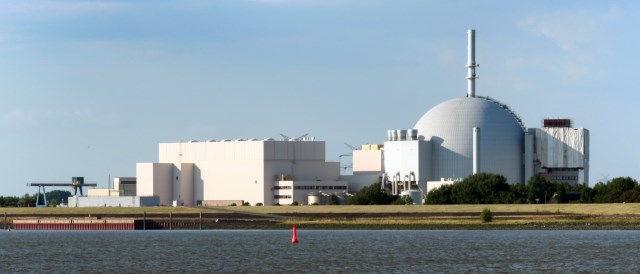The term “Energiewende” did not come about in 2011, but rather in the late 1970s, and it was canonized in an eponymous book from 1980. But a close read reveals that “Energiewende: growth and prosperity without petroleum and uranium” is not about phasing out coal at all – quite the contrary, as Craig Morris reports in this three-part series.

The Brokdorf nuclear plant, one of two main places where the German anti-nuclear movement started. The plant will be one of the last to go offline in 2021. (Photo by Alois Staudacher, CC BY-SA 3.0)
Predicting the future is a fool’s errand. Writing in the late 1970’s, the authors of the original Energiewende write that the population of (West!) Germany could drop from around 60 million to 37 million by 2030 “given current birth rate trends,” though they elsewhere put the figure closer to 45 million; the inconsistency apparently got past the editors.
Nine years before the Wall fell, the authors obviously did not see Reunification coming. Neither did I, however, on my first trip to East Berlin – five months before the Wall came down. The German population now stands at around 80 million, though the forecast at current birth rates still has it shrinking.
Overall, the study put an entire political movement into print. Indeed, the authors themselves were among the protesters against nuclear in the 1970s. Florentin Krause held a PhD in chemistry from the University of Berkeley in California and was a cofounder of the Öko-Institut in Freiburg, just a stone’s throw from the proposed Wyhl nuclear plant (which was never built). The two other co-authors, Hartmut Bossel and Friedrich Müller-Reissmann, were also academics, the former a Doctor of Philosophy of Engineering in Berkeley, and the latter a theologist and computer science at what is now the Pestel Institute in Hannover.
The combination is striking – and typical of the movement in Germany, which has always consisted of experts in the field combined with a focus on ethics. The combination of conservation and conservatism is one thing that has kept the renewables movement in Germany moving forward, and while the Energiewende is now held to be setting an example for the world, Germany clearly got where it is by copying international best practices – something I will come back to later.
You don’t have to look hard to find people in the German renewables community who feel that the word “Energiewende” has been hijacked by those who opposed it all along. For instance, a German colleague at the industry monthly Sonne, Wind & Wärme recently pointed out (in German) that the term goes back to this book, which (she claims) shows how Germany can switch from “coal and uranium” to renewables.
But as we point out in our History section, the full title of the book is “Energiewende: growth and prosperity without petroleum and uranium.” There is no mention of coal in the title. And for those of us who would like to have a coal phaseout, it’s all downhill from there.
To cut right to the chase, the book’s most progressive scenario has Germany getting 44 percent of its energy from renewables and the other 55 from coal; the missing percent is a rounding error, and the authors have not discovered the magic of Factor 4’s simple message – “doubling wealth, halving resource use” – when they write that people will be traveling 70 percent more by 2000 but consuming 44 percent less fuel.
Was climate change not as great a concern as energy independence back then? There are a few mentions of carbon emissions, for instance when the authors point out that the 55 percent share of coal in energy consumption would be possible without raising coal consumption thanks to the more efficient combustion in distributed cogeneration units. Oil and gas would, however, be done away with completely, so “emissions of carbon dioxide would be drastically reduced overall” – a clear sign that the authors understood carbon emissions in the context of climate change.
When it comes to coal, however, the buzzword in the book is not climate change, however, but heimische Kohle or “domestic coal.” And heimisch has a certain emotional attachment to it in a way that Inland does not in words like Bruttoinlandsprodukt (gross domestic product).
If this position can be understood (though perhaps not defended) against the backdrop of two oil crises in 1973 and 1979, does the study’s position on nuclear have any relevance today? I address that question in my next post.
Craig Morris (@PPchef) is the lead author of German Energy Transition. He directs Petite Planète and writes every workday for Renewables International.